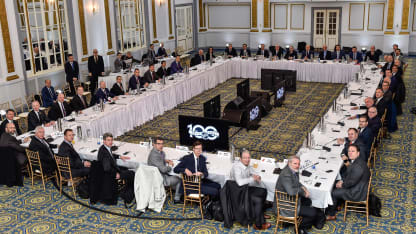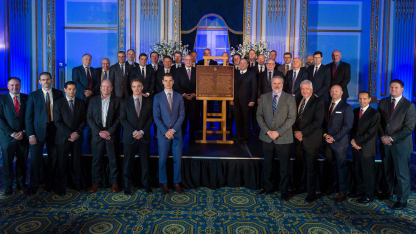Each November, the NHL general managers gather for a brief meeting, mostly to set the agenda for a three-day meeting each March, when issues are examined closely and rule changes are sometimes recommended.
Usually, the November meeting is held at the NHL office in Toronto the morning after the Hockey Hall of Fame induction. Friday, they held it at Le Windsor, once known as the Windsor Hotel, where the NHL was founded almost exactly 100 years ago, on Nov. 26, 1917.
The GMs discussed offside rules, goaltender interference, slashing and hits from behind into the boards. But they also watched a video about the leaders of the NHL and the 191 general managers in its history, and attended the unveiling of a plaque recognizing the site as the birthplace of the League.
"It's pretty neat that basically 100 years ago, five people sat in a room and decided to form the League, and here we are today with 31 teams and over 800 players," said Minnesota Wild GM Chuck Fletcher, who was born in Montreal and is the son of former NHL GM Cliff Fletcher. "It's been a great yearlong (Centennial) celebration, really, but for me this has been probably the best experience."
The GMs watched video examples of offside and goaltender interference, then voted so the NHL Hockey Operations Department could see where they stood on each. They mostly agreed with the calls made.
"If you're 70 percent consensus in a lot of areas, I think you're in pretty good shape," Edmonton Oilers GM Peter Chiarelli said. "And we were generally in that area."
The NHL introduced a minor penalty this season for a coach who challenges an offside call and loses. It has cut down on challenges and delays.



